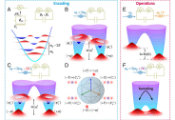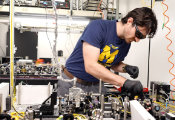Quantum Computing for the Mobility of the Future: DLR QCI Receives Support From Planqc, D-Fine, and Other Industrial and Research Partners
May 06 2025 -- How can quantum computers contribute to the sustainable, efficient and demand-oriented mobility of the future? As part of the application project QCMobility, the DLR Quantum Computing Initiative (DLR QCI) of the German Aerospace Center has commissioned the quantum computer manufacturer planqc and the consulting firm d-fine to find specific answers to this question. To this end, they are collaborating with other partners from research and industry in two sub-projects.
- The sub-project QCMobility | Intermodal Transport is investigating how quantum computers can help to better plan and control freight transportation across different modes of transport – i.e. rail, road, and waterways. The project partners are Fraunhofer CML, Kombiverkehr, TriCon and UIRR as subcontractors. The Port of Duisburg (duisport) is involved in the project as an associated partner.
- The sub-project QCMobility | Road Transport focuses on urban and rural transport – specifically on-demand services and delivery services. The aim is to use quantum algorithms to make dynamic processes such as the use of suitable stops or route planning more intelligent. The subcontractors are DB Regio Bus, Fraunhofer IML and Rhein-Neckar-Verkehr. The logistics company Dachser is an associated partner.
Both sub-projects address one central problem: the increasing complexity in the planning of modern transportation and logistics systems. A large number of influencing factors – such as the traffic situation, capacities, demand, time windows or environmental influences – must be taken into account simultaneously and constantly re-evaluated. Traditional computers are reaching their limits here.
Together with the teams from the DLR Institute of Transport Research and the DLR Institute of Quantum Technologies, d-fine, planqc and their project partners are working on the development and evaluation of quantum-based optimization approaches – based on real use cases and data sets from practice. The focus is not only on new solutions through the use of quantum computing, but also on building a strong, practical ecosystem: research, start-ups and industry are working together to build up expertise in the field of quantum computing.
QCMobility | Intermodal Transport: Using quantum computing to improve supply chains
The sub-project QCMobility | Intermodal Transport is investigating how quantum computing can help to manage freight transport more efficiently – especially where several modes of transport such as rail, truck and ship are interlinked. The aim is to optimize complex planning and control processes along intermodal supply chains and thus support the shift of transports, e.g. to the more environmentally friendly railways.
Practical use cases are developed in the project and mapped as mathematical optimization problems – for example, for controlling handling processes or planning complex transport networks. Dynamic systems, in which different modes of transport must be coordinated, pose major challenges for conventional methods. The project uses real-life data, such as route, timetable and booking information, to create realistic scenarios that are analyzed and evaluated using quantum-based optimization approaches.
The consortium for QCMobility | Intermodal Transport, consisting of d-fine and planqc, will be supplemented by additional industry partners: UIRR as International Union for Road-Rail Combined Transport, Kombiverkehr as an operator in combined transport with a Europe-wide freight transport network and TriCon as the operator of a trimodal transhipment terminal will contribute their expertise and data to the project as subcontractors. The Fraunhofer Center for Maritime Logistics and Services (CML) as another subcontractor is contributing its know-how in the field of logistics and QC applications to the project. In addition, duisport, Europe's largest inland port and leading hinterland hub, is involved in the consortium as an associated partner.
QCMobility | Road Transport: Quantum computing for innovative transport and delivery concepts
How can we respond to growing traffic, increasing delivery and mobility needs and limited public space – and at the same time respond flexibly to demand and the traffic situation? This is precisely where the sub-project QCMobility | Road Transport comes in: The aim is to use quantum computing to plan and control dynamic and space-related mobility and delivery processes more intelligently.
The focus is on two central fields of application: on-demand transport – i.e. demand-oriented mobility services in which vehicles are used flexibly according to demand (also known as demand-responsive transport, or DRT for short) – and urban delivery services such as courier, express and parcel services (CEP). Both systems face similar challenges: limited road space, changing requirements, real-time demand – and the question of how virtual stops or loading zones can be optimally distributed and used.
In close cooperation with industry and research partners, specific application scenarios are developed in the project, transferred into mathematical models and analyzed using specially developed quantum algorithms. The aim is to help transport companies and logistics companies make decisions in complex, dynamic planning processes.
The sub-project QCMobility | Road Transport is being coordinated and implemented by d-fine and planqc, who are working together with other partners. These include Rhein-Neckar-Verkehr GmbH as a transport company and DB Regio Bus as a bus company, both of which are contributing data and practical experience as subcontractors. As an associated partner, Dachser contributes know-how from inner-city logistics. The consortium is complemented by the Fraunhofer Institute for Material Flow and Logistics (IML), which is contributing its research expertise in mobility and logistics issues to the project as a subcontractor.




































